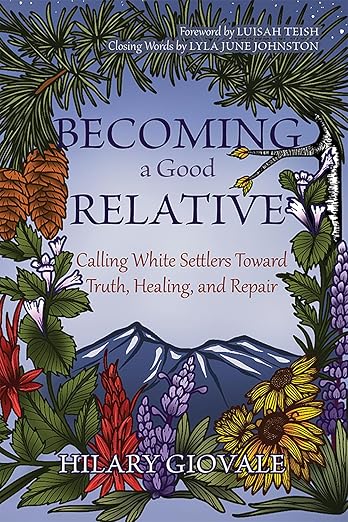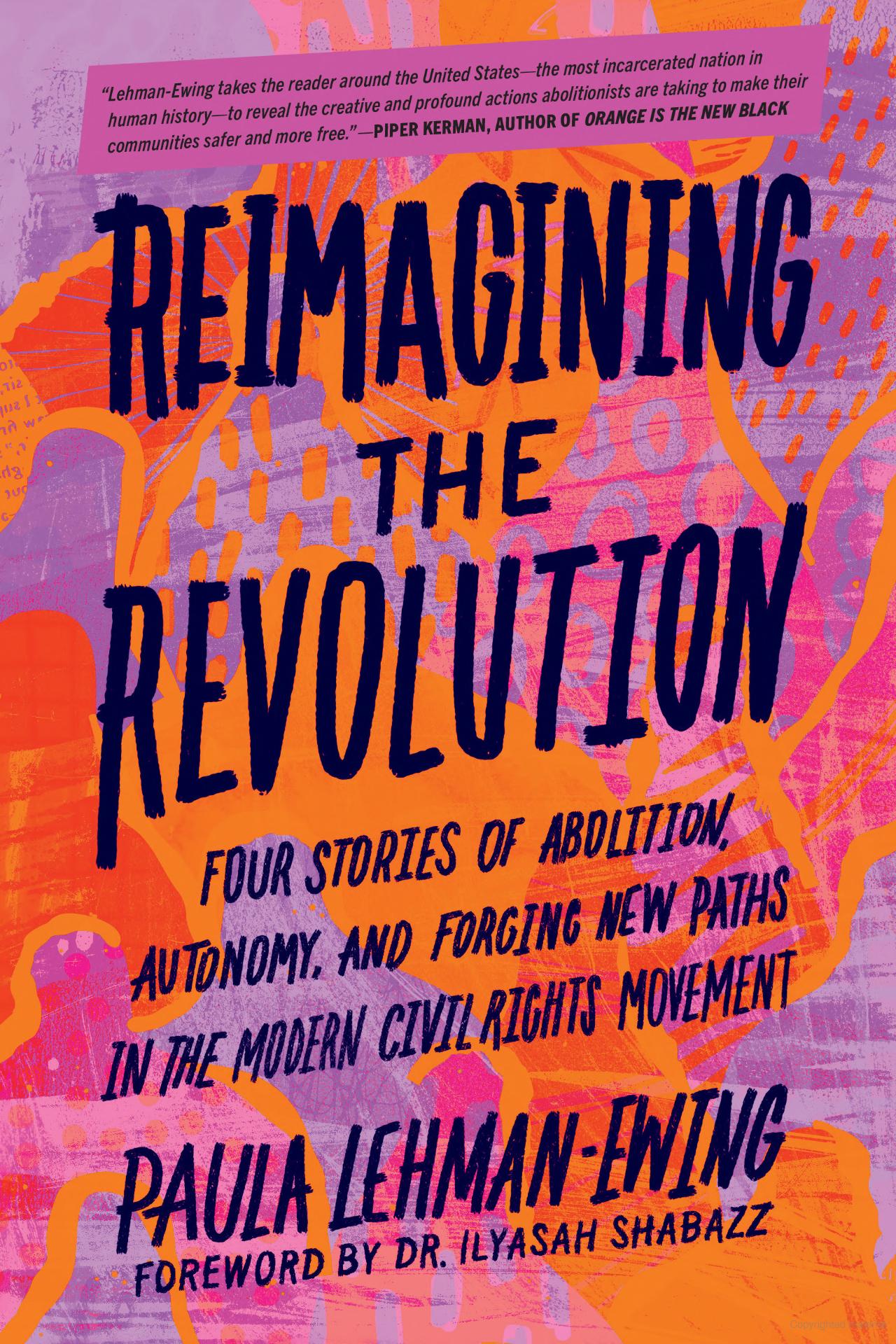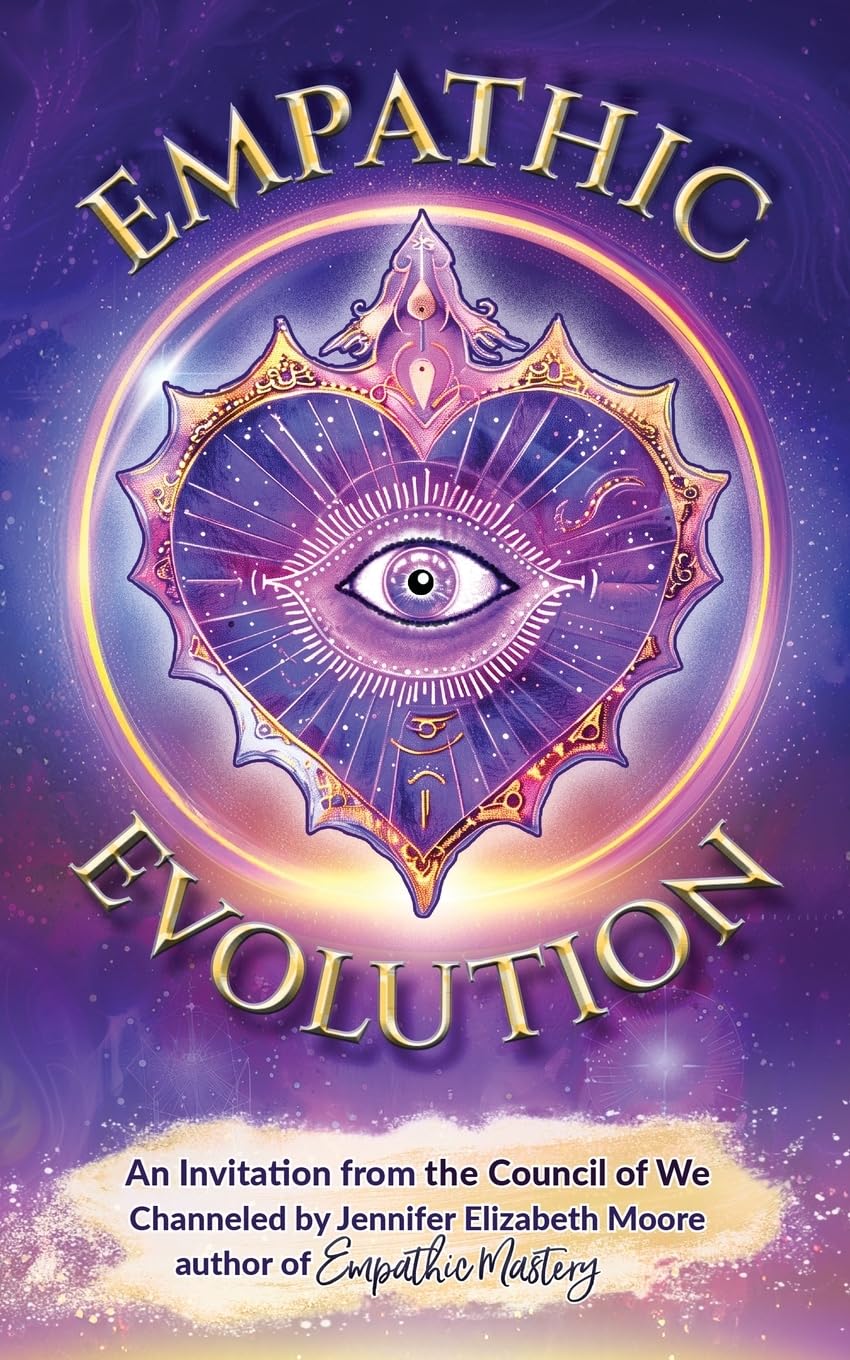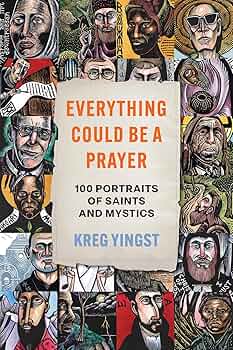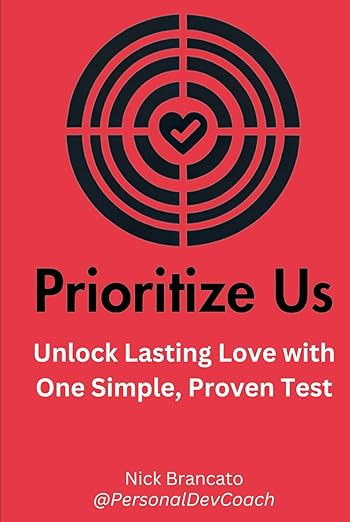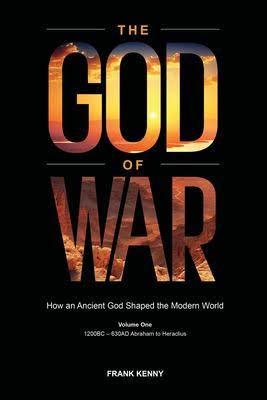Saturday, November 16, 2024
Becoming a Good Relative
Hilary Giovale has devoted her life to understanding the erased history of her white ancestors and healing from the harms of whiteness. In "Becoming a Good Relative," Giovale offers her transformative journey of grappling with ancestral memory to understand her inheritance of whiteness in a colonial paradigm. Her exploration of her Scottish and Irish ancestry, seeking parallels with Indigenous perspectives that honor the land and all beings, has led her to a profound understanding of the harms of settler-colonial perspectives. Through a narrative that weaves profound realizations about cultural amnesia and socioeconomic inequities. Giovale advocates for wealth redistribution, reparations, and truth-telling as necessary steps toward change.
What makes Giovale’s narrative particularly exceptional is the emphasis on humility. She shares her mistakes and how she has humbly made amends, a process that involves listening to Indigenous people, admitting missteps when interacting with cultures not her own, and asking for grace from the people she has unknowingly harmed. While "Becoming a Good Relative" is primarily written for white-identified readers, Giovale has essential lessons about untangling from whiteness for people of all identities. In one way or another, anyone living amid white supremacy internalizes its lessons: who and what is valued, how and why others are subjugated, and how we all are complicit in perpetuating injustice. Giovale invites readers to be more empathetic in our journeys of changing perspectives and embodying respectful relations.
Friday, November 15, 2024
Reimagining the Revolution
Paula Lehman-Ewing, a seasoned journalist, presents her work “Reimagining the Revolution,” which delves into the modern prison abolition movement in the United States. Mass incarceration affects the lives of countless Black and Brown individuals and their families, perpetuating systems of oppression and inequities. Lehman-Ewing profiles organizations and people leading social justice movements to address the root causes of inequities: infrastructure, community development, and economics. The author highlights the groundbreaking work of organizations such as Critical Resistance and the United Black Family Scholarship Foundation, which are led and supported by those most affected by the racist carceral system.
Abolition is not an impossible dream. The author’s writing is characterized by fortitude and directness, as she offers a call to action to pay attention and act. Lehman-Ewing recommends four strategic steps to show readers how those most impacted by the interlocking systems of oppression are developing solutions that work best for communities of color.
Brutality and violence are the tools of police and prisons. Rather than fix a broken system, Lehman-Ewing offers a vision for abolition embodied in everyday practices for anyone. In her role as a storyteller, the author weaves her own reflections into the narrative. She is clear about her position as a witness, not a central player.
Monday, November 11, 2024
Empathic Evolution
If you identify as an empath, then you understand yourself as a highly sensitive individual who takes in the thoughts, feelings, and sensations of the world around them, often processing these as if they were your own. As an empath, you may be looking for guidance on how best to protect one’s energies, by setting boundaries, releasing burdens, and cultivating joy.
In her latest release, “Empathic Evolution,” healer and mentor Jennifer Elizabeth Moore offers guidance and support for empaths navigating their sensitivities. Moore advises empaths to engage in grounding practices, stay connected to their bodies, and embrace creativity and joy to process emotions. Trusting in the divine and allowing oneself to relax are highlighted as essential for protection and safety. Moore shares helpful strategies for navigating emotional healing and warns against spiritual bypassing. Through actionable practices such as breathwork, meditation, acts of kindness, among others, empaths and spiritual seekers can embrace their gifts for healing, fostering community, and divine guidance.
Moore’s advice resonated deeply for me on my path to deepen my understanding of healing from ancestral trauma. What was most powerful about Moore’s message was how empaths can nurture their abilities and inclination for helping and caring for others, while also staying grounded in safety and connection. As a student of Buddhism who subscribes to the dharma of suffering, I appreciated Moore’s discussion about spiritual bypassing. She notes that spiritual bypassing is the practice of seeking bliss by “tuning out all awareness of the suffering, violence, and abuse of power.” It allows individuals to stay in a "happy bubble" and ignore the misery around them. Moore criticizes spiritual bypassing for not contributing to true spiritual evolution.
“Empathic Evolution” encourages self-acceptance, recognizing one's worthiness, and practicing generosity and collaboration to foster abundance. Reflecting her life’s work in supporting sensitive women, Moore writes in a reflective and supportive tone. Although she dispenses advice, her tone is consistently calming, comforting, and encouraging. Overall, the book serves as a tool for empaths to achieve emotional and spiritual wellness.
Saturday, November 9, 2024
Everything Could Be a Prayer
Yingst is a renowned American illustrator and block artist whose works are in private collections and museums. In the book’s introduction, he shares how the pandemic, a time of collective suffering and reflection, allowed him the time and attention to devote to the meditative act of offering devotions to faithful and dedicated figures in the Christian church. The project evolved to incorporate human and civil rights icons who risked their lives to speak truth to power and create change.
"Everything Could Be a Prayer" is a brilliant and uplifting collection of profiles that manifests kindness, generosity, gratitude, and service to others. One can use the book as a meditative reader; each prayer and life story is a compass for virtuous living.
Sunday, November 3, 2024
Prioritize Us: Unlock Lasting Love
For partnerships to endure and overcome challenging times, couples must communicate honestly about their priorities and expectations. This open dialogue can bring relief, as it helps prevent conflicts stemming from deeper, unresolved differences in what each partner values most. Personal development coach and educator Nick Brancato shares practical strategies for couples to enhance their collaboration through "Prioritize Us: Unlock Lasting Love with One Simple, Proven Test." Drawing from his decades of experience working with individuals and couples, the author offers practical tools for couples to identify, understand, and realign their priorities. Among these tools is the Total Difference Score (TDS) system, which measures alignment between partners' life priorities. According to Brancato, misaligned priorities can create stress, tension, and unmet expectations in relationships, and invite readers to reflect upon their own experiences in their relationships.
By aligning priorities, couples can work together on open communication, increasing empathy, and acting intentionally to navigate differences and build a collaborative partnership. Brancato offers valuable tips for improving communication, including regular check-ins and adjustments as life circumstances change to ensure both partners feel seen, heard, and supported. He advocates for regular discussions about priorities, urging partners to listen without judgment and express their needs clearly.
One piece of advice that stood out for me is Brancato’s challenge for readers to take communication about priorities a step further by turning priorities into meaningful goals. This process of goal-setting can be empowering, as it provides a clear path for personal and relationship growth. In business settings, the SMART goal framework – an acronym for specific, measurable, actionable, relevant, and time-bound – ensures goals are clear and achievable.
Successful relationships require willingness from both parties to put in the work of intentional tending and continuous effort. Being married for more than a decade, I found Brancato’s advice relevant and applicable to couples at any stage in their relationship. Any opportunity to learn about each other opens the doors for a greater understanding of what the other person needs to thrive and be whole in the relationship. The book shares discussion prompts that are useful for guiding communication, for example: "Which priority feels most neglected right now?" or "How can we support each other's top priorities more effectively?" Actionable advice and exercises can help couples navigate conflicts, set meaningful goals, and celebrate progress. The exercises invite truthful and candid responses to name values, goals, and priorities.
Advice offered in //Prioritize Us//is organized and designed to be accessible and practical, offering clear and actionable steps. Brancato’s way of dispensing information is both methodical and supportive, making it easy to follow and apply the concepts. This book can serve as a helpful guide for couples intent on enhancing their connection. Readers will learn that they can co-create a balanced, fulfilling relationship by turning priorities into specific, actionable goals and tracking progress.
Saturday, November 2, 2024
Zawa + The Belly of the Beast
The guardian spirit of a revered mountain has been secluded and hidden away, with nothing to feed on but sludge and garbage. Meanwhile, the people of Mesa’s Boon are obsessed with industrialism’s decay, with the mayor forbidding the planting of trees. An urban legend about monsters hiding in the bowels of the mountain has been around for a while.
Few things nourish the heart and spirit more than meals created with love and shared with friends. Siblings Bandit and Thatcher Blackbird stumble upon the guardian, Zawa, who is derelict and unrecognizable after a long period of neglect. She regains her strength through food lovingly prepared by Chef Bandit. Soon, the accomplices learn of Zawa’s true nature and the lies they long believed to be the truth. Helping her escape will mean defying powerful leaders and convincing others to change their ways.
Zawa and the Belly of the Beast is a vibrant and compelling tale that warns against the spoils of unchecked development and industrialization. The story instills hope by showing how young people can make a difference by being smart and relying on each other. Writer and illustrator Michael Dialyna builds upon myths of mountain deities as protectors of the land. The bright and vivid colors bring out both the disgusting wasteland of urbanization and the inviting beauty of the wilds. The metaphor of food and feasting figures prominently in the story, as nourishing the environment back to health requires intentional offerings.
Editor's Note: This review was originally published in Chicago Book Review.
The God of War
Abrahamic religions have shaped the modern world. In the age of globalization, the monotheistic belief systems of Judaism, Christianity, and Islam have an outsized influence across the globe. Religious researcher and historian Frank Kenny, in his book "The God of War," offers a unique perspective on the wars and conflicts throughout time that influenced the development of Christian doctrine, church history, and the role of religion in people’s lives. Kenny's work stands out for its comprehensive exploration of the geopolitical and religious dynamics of the region, highlighting the influence of various empires and the spread of monotheistic religions.
Through a critical analysis of Biblical accounts, he presents a thorough and nuanced analysis of the theological developments and debates within early Christianity. The author discusses the development of the concepts of the nature of God, the divinity of Jesus, the Kingdom of God, and salvation. Kenny thoroughly explores the persecution of Christians by Roman authorities and the development of a “martyrdom cult,” a part of the early Christians' responses to religious oppression.
“The God of War” is an apt title for a book that delves into the enduring legacy of religious and political conflicts. These conflicts, which contributed to the fall of the Roman Empire, have given rise to new powers and persistent divisions within Christianity. Kenny's objective stance on scripture and the gospel, presented in an engaging style, is a catalyst for critical thinking about the interplay between religion, politics, and society.
My interest in the book stems from my lifelong critique of Christianity from a decolonial perspective. I sincerely appreciate Kenny’s factual approach to presenting Biblical conflicts from a historical perspective and showing how war and conflict have defined the modern era. History enthusiasts, academics, and anyone curious about the interplay of political and religious dynamics would find value in the book. For Christians, the book offers a respectful invitation to engage with the text, fostering an attitude of learning about different perspectives and interpretations of history.
